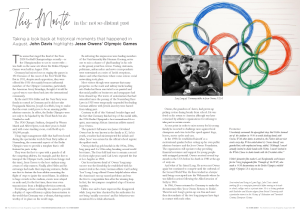By John Davis

The arena that staged the final of the Euro 2024 Football Championships recently—or the Olympiastadion to use its correct title—was built on the same site where the Berlin Olympic Games were held in August 1936.
Germany had missed out on staging the games in 1914 because of the onset of the First World War. But in 1931, despite much opposition, they were offered the 1936 slot mainly because influential members of the Olympic Committee, particularly the American Avery Brundage, thought it would be a good way to ease them back into the international community.
By the mid-1930s Hitler and the Nazi Party were firmly in control in Germany and it did not take Propaganda Minister, Joseph Goebbels, long to realise that the event could prove to be an amazing public relations exercise. In effect, the Berlin Olympics were not only to be hijacked by the Third Reich but also Nazified as well.
The 1936 Olympic Stadium, designed by Werner March and Albert Speer, took three years to build and, with some standing room, could hold up to 100,000 people.
Using stage management skills that had been honed during the spectacular torch-lit Nazi Party rallies at Nuremberg, the ceremonial aspects of the Berlin Olympics were to provide a template that is still featured in parts today.
They were the first to open with a parade of all the competing athletes, for example, and the first to transport the Olympic torch, (made from Krupp steel this time), from Greece to the host stadium using a team of relay runners. Finally, after Hitler and his entourage had made their imposing entrance, Berlin was first to feature the lone athlete mounting the flight of steps to ignite the sacred flame. In addition to huge crowds in the stadium, events were relayed on radio and, for the first time, there were even transmissions from a fledgling television network.
Everything, at least outwardly, was aimed to provide a display of super-efficiency-a glitzy demonstration to the world that Germany was a vibrant, thriving nation worthy of its place on the world stage.
Re-inforcing this impression were leading members of the Nazi hierarchy like Herman Goering, never one to miss a chance of ‘glad-handing’ in his role as the genial, jovial bon viveur. Visiting statesmen, politicians, ambassadors and news correspondents were entertained at a series of lavish receptions, dances and other functions where some serious social networking took place.
Most visitors though were unaware that many properties on the roads and railway tracks leading into Berlin had been renovated or re-painted and that racial graffiti on businesses and synagogues had been cleaned up. The waves of antisemitism that had intensified since the passing of the Nuremberg Race Laws in 1935 were temporarily suspended but leading German athletes with Jewish ancestry were barred from taking part.
Contrary to all of this National Socialist hype and the fact that Germany finished top of the medal table, the 1936 Berlin Olympiad is best remembered for a quiet, unassuming African American athlete named Jesse Owens.
The sprinter’s full name was James Cleveland Owens but he was known in the family as JC. In his youth, a teacher had misinterpreted the initials and when ‘Jesse’ was entered in the official school register the epithet stuck.
Owen picked up gold medals in the 100m, 200m, long jump and 4 x 100m relay, breaking several world best times. The four-fold haul was to remain a record for forty-eight years until Carl Lewis repeated the feat at Los Angeles in 1984.
One lesser-known detail of Owens’ long jump success was the friendship he established with his nearest rival in the event, German athlete Carl Ludwig ‘Luz’ Long. Long offered Owens helpful advice when the American’s run-up caused problems and was the first to congratulate him after the winning leap. In fact, the two jumpers completed a lap of honour together.
Hitler, was said to have expressed his disapproval while Long was later chastised by the authorities for not being ‘racially conscious’ and his behaviour was monitored for a while afterwards.
Owens, the grandson of slaves, had grown up picking cotton during breaks from school. He was feted on his return to America although was later ostracised by athletics organisations for refusing to take part in certain events.
At one point in order to raise money for his young family he resorted to challenge races against local champions and even tested his speed against dogs, horses, motor cycles and cars.
In the 1950s he established himself as a motivational speaker before setting up his own public relations business and the Jesse Owens Foundation. The organisation still operates today providing financial assistance and support for young people with untapped potential. Owens received several top awards in the USA before his death in 1980 at the age of sixty-six.
And what of his friend Long. He never met Owens again but continued to compete until the outbreak of the Second World War. He then worked as a lawyer until being conscripted into the Wehrmacht where he was killed in action following the Allied invasion of Sicily in 1943.
In 1966, Owens returned to Germany to make the documentary film ‘Jesse Owens Returns to Berlin’. There he met Long’s grown-up son Kai and since then descendants of the two long jumpers have kept in contact with each other.
Footnotes:
Uncertainty surrounds the apocryphal story that Hitler stormed out of the stadium in 1936 to avoid shaking hands with Owens. With other duties to attend to, the Fuhrer did not visit events every day. When asked about it, Owens himself was guarded but, with emphasised irony, added, “Although I wasn’t actually invited to shake hands with Hitler, I wasn’t invited to the White House to shake hands with the President either.”
Hitler’s favourite film maker Leni Rienfenstahl, well known for her Nazi propaganda film ‘Triumph of the Will’, also made a 1938 documentary on the Berlin Olympics entitled simply ‘Olympia’. It is easy to access.




